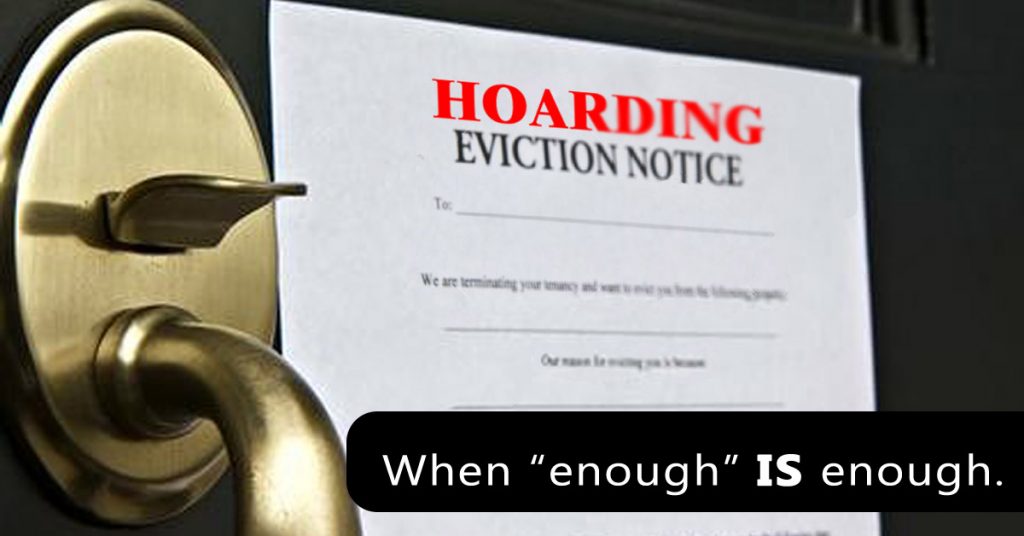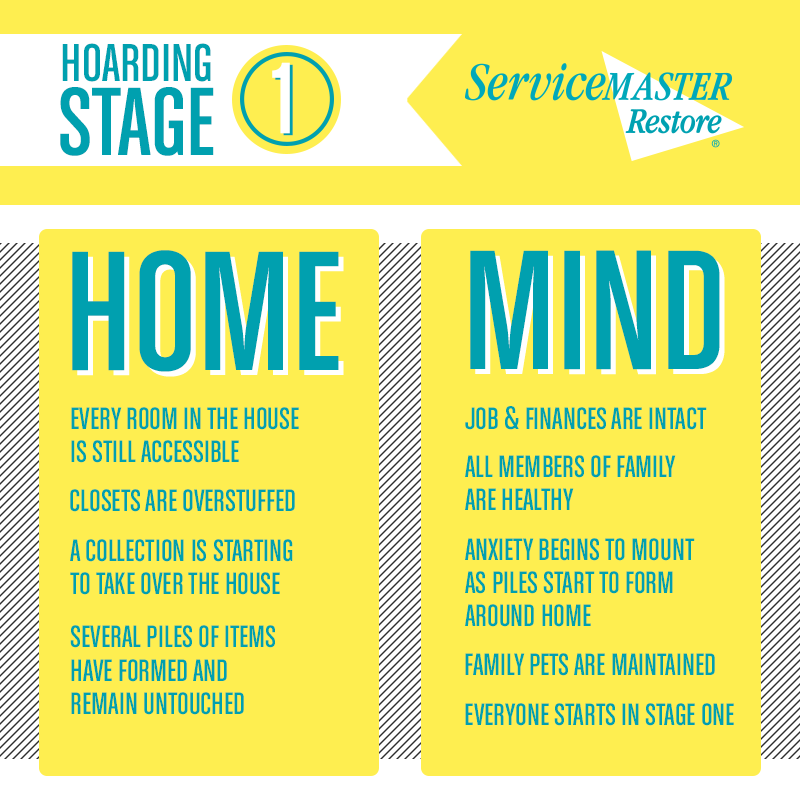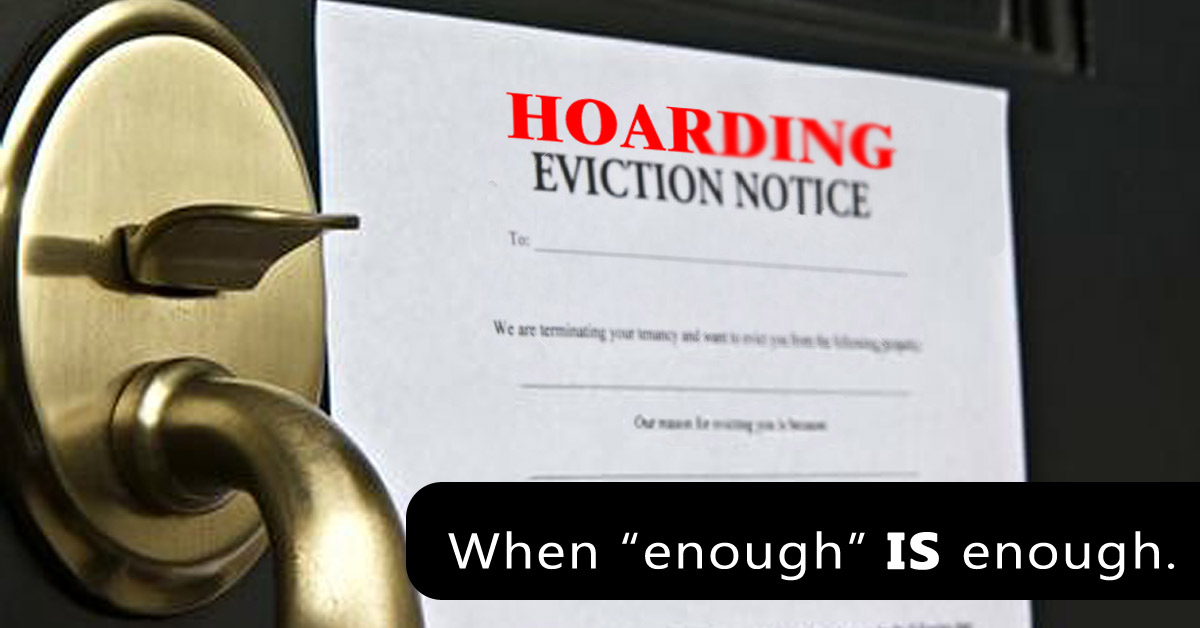Landlords who own and rent homes and apartment buildings have a lot of issues to deal with from their tenants. Tenants may be late on their rent, cause damage to the property, or even get into disputes with their neighbors which requires intervention from the landlord. One major problem that landlords may have to deal with is having a tenant affected by hoarding disorder. Hoarding tenants can cause serious property damage by allowing clutter to build in their homes or apartments. The piles of clutter not only make the home dangerous to walk through, but they also harbor mold, bacteria, and sometimes pests that can contribute to property damage and make the living space unsanitary.
 Dealing with a hoarder tenant is a delicate issue for landlords. You cannot simply evict the tenant and force them to clear everything out from the home or apartment. People who struggle with hoarding suffer from a real mental condition called hoarding disorder and throwing them out of the home due to their hoarding behaviors can get landlords in legal trouble. However, you must take immediate action if you do have a hoarding tenant because their behaviors damage your property and compromise their safety and that of other tenants in the building. This guide will help you take the right approach to dealing with a hoarding tenant, so you can resolve the issue delicately and respectfully.
Dealing with a hoarder tenant is a delicate issue for landlords. You cannot simply evict the tenant and force them to clear everything out from the home or apartment. People who struggle with hoarding suffer from a real mental condition called hoarding disorder and throwing them out of the home due to their hoarding behaviors can get landlords in legal trouble. However, you must take immediate action if you do have a hoarding tenant because their behaviors damage your property and compromise their safety and that of other tenants in the building. This guide will help you take the right approach to dealing with a hoarding tenant, so you can resolve the issue delicately and respectfully.
Dealing with Hoarding Tenants Delicately
In order to properly deal with a tenant who hoards, you must have an understanding of hoarding disorder as well as how to approach hoarders delicately. The following are some important things to keep in mind when dealing with hoarding tenants:
- Hoarding disorder is a real mental disorder: Hoarding disorder is an officially recognized subtype of Obsessive-Compulsive Disorder (OCD). Those affected by hoarding disorder face extreme anxiety or depression that prevents them from getting rid of anything they have collected in their home. As a result, they develop an extreme emotional attachment to their belongings and allow them to build up to a dangerous level. Because hoarding disorder is officially recognized by the American Psychiatric Association, it is considered a disability. This means that hoarders are protected under the federal Fair Housing Act and landlords must try to reasonably help and accommodate the affected individuals before they can resort to eviction.
- Hoarding creates dangerous conditions: Hoarding requires an immediate response because hoarding behaviors create conditions that are dangerous for the hoarder and other tenants in the building. The clutter buildup restricts access in the unit, increases the risk of injuries and fires, and harbors dangerous toxins and pests. The conditions created by hoarding behaviors violate many state and local health and fire codes.
- Hoarding behaviors are sometimes caused by a traumatic event: Typically, hoarding behaviors are triggered by some sort of traumatic event in the life of a hoarder. It is important to show compassion for hoarder tenants, especially if they pay their rent on time and do not cause any other types of trouble on the property. Approaching the hoarder in a respectful manner to help them is a much better solution than threatening to kick them out.
Be Proactive in the Lease Agreements
 It is within the legal right of a landlord to put certain provisions in their lease agreements which can avoid a complaint under the Fair Housing Act. When drafting your lease agreements, consider the following:
It is within the legal right of a landlord to put certain provisions in their lease agreements which can avoid a complaint under the Fair Housing Act. When drafting your lease agreements, consider the following:
- Clearly state your housekeeping standards so that all tenants signing the agreement understand that they must follow these standards. This gives you legal standing if there is a problem in this area.
- Write a provision so you can access a unit after giving the tenant reasonable notice.
- Include clear rules regarding the buildup of clutter in the unit. This can include prohibiting clutter buildup near windows, doors, stairs and appliances; prohibiting the storage of flammable items; requiring that tenants take proper care of their pets; and requiring tenants to regularly dispose of their garbage.
- Clearly state that these rules are in place to protect the health and safety of the tenants so that they will understand the importance of keeping their unit clean and sanitary.
Working these rules into your lease agreements may seem somewhat extreme, but it helps you protect your property and the safety of your tenants. You can also screen tenants before allowing them to move in to avoid leasing to tenants with hoarding issues.
The Signs of a Hoarder on your Property
 If you happen to notice the warning signs of hoarding from a tenant before the problem gets out of control, you have a better chance of preventing damage and helping the tenant with their disorder. The following are common warning signs of hoarding:
If you happen to notice the warning signs of hoarding from a tenant before the problem gets out of control, you have a better chance of preventing damage and helping the tenant with their disorder. The following are common warning signs of hoarding:
- Pests: Pests such as insects and rodents are drawn to heavily cluttered areas because they provide them with shelter and sometimes food.
- Foul odors: A strong unpleasant odor coming from a unit could indicate a hoarding issue.
- Cluttering in common areas: If a tenant has some belongings in the hallway, this could mean that they have run out of room in their unit due to excessive cluttering. It is also a safety hazard to have clutter buildup in common areas like stairways and hallways.
- Too many pets: Some people hoard animals as well as objects. If you notice that a tenant has an unreasonable number of pets, there could be an issue. People who hoard animals cannot properly take care of them, causing the animals to experience poor health and malnutrition. Too many pets in one unit can also lead to unsanitary conditions.
- Tenant won’t allow access to unit: One of the most common behaviors of hoarders is that they do not let people into their homes or apartments because they are embarrassed by the conditions their hoarding behaviors create. If you have a tenant that goes out of their way to deny entry to you, friends and family, or maintenance workers, then they may have a serious hoarding issue.
Verify if a Tenant is Hoarding
While each of the hoarding signs listed above are common in most cases of hoarding, any one of these signs by themselves are not definite indicators of hoarding. Noticing these signs may raise your suspicions, but you must find out for sure if there is a hoarding problem before taking any action. You must be careful with your investigation because you cannot force entry into their unit. Tell the tenant that you suspect of hoarding that you need to visit their unit, but try not to intimidate them into letting you in. If you are denied access, you can reach out to the local fire department and health department to cite safety concerns as a means to enter the unit.
When you gain entry into the unit, document the conditions with notes and pictures. Do not get into a confrontation with the tenant, it is important for you to show compassion and gain the trust of the tenant so you can help resolve the issue. The best approach is to explain how the living conditions are dangerous and put the safety of the hoarder and others within the building at risk.
What to Do About a Hoarder Tenant
In cases of extreme hoarding, the affected individuals need outside professional help to clean and restore the home, as well as help from a social worker or psychologist to deal with the mental aspect of the issue. The landlord is responsible for accommodating the tenant to help them effectively restore their home and deal with their condition. The following steps will help you resolve a hoarding issue with a tenant:
- Help the tenant help themselves: Talk to your tenant about what they can do to help clean and remove some of the clutter. Start with simple tasks like clearing walkways and removing trash and give them a reasonable time to comply. As they complete these tasks, you can then give them a few more to help further clean up the unit.
- Create a written plan for the cleaning process: It helps to write out the steps of the cleaning process for the tenant to follow. As described in the previous point, start with easy to handle tasks and gradually introduce bigger tasks to help clear out a good chunk of the clutter. Make sure you address obvious problems first like garbage buildup and code violations to help the tenant understand the importance of cleaning the unit. Always remember to give the tenant ample time to complete each task.
- Call professionals for counseling and hoarding cleaning: Many people who struggle with hoarding do not think that they have a problem and may have a hard time confronting their issue. Enlisting the help of counseling professionals can help the hoarder come to terms with their disorder and receive the necessary treatment. Calling in a professional to provide hoarding clean up services can also help because these professionals can thoroughly and effectively clean the home, and they are trained on the proper ways to approach a hoarder. Make sure you document everything you do to accommodate the hoarder, including your actions and expenses.

If the tenant complies with your requests and has their unit cleaned and restored, then make sure you provide continued support to help them keep their unit clean. Visit their unit and be friendly, encourage them to keep their unit clean and offer them further assistance if there is a problem. If the tenant refuses to comply and continues to hoard in the unit, you can seek an eviction. It is in your best interest to consult a lawyer first to ensure that you are not violating your lease contract or the Fair Housing Act. You must base your eviction on the dangerous conditions created by the hoarder, how these conditions affect other tenants in the building, and the tenant’s refusal to comply with your reasonable requests.
It can be difficult to deal with a tenant on your property with a hoarding issue, but it can be done with the proper approach. You must always show compassion and respect for the tenant, make reasonable accommodations to help them resolve the issue, and ensure that you are not violating the Fair Housing Act or the terms of your lease agreement. When you are ready to hire professionals to clean out the unit, contact ServiceMaster NCR for our hoarding cleaning services. Our professionals are respectful of the affected individuals and take a careful yet effective approach to completely clean and sanitize the entire unit. You can rest assured that our professionals will return the unit back to a safe and sanitary condition.













